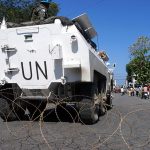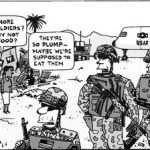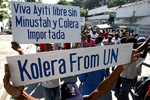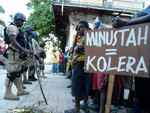Haitians Demand UN Takes Its Colonial Army MINUSTAH Out!
By Dady Chery
Haiti Chery

Demonstrators march in Port-au-Prince on June 1, 2010, sixth anniversary of the occupation of Haiti by United Nations forces (MINUSTAH) on behalf of U.S. imperialism. Sign says: “Down with the Occupation, Down with the Reconstruction Plan, Long Live a Socialist State.” (Photo: Haïti Liberté)
It is high time to bid good riddance to MINUSTAH (Mission des Nations Unies pour la Stabilisation en Haiti), a colonial army that has terrorized Haiti for the last six years and is currently overseeing the sham presidential and legislative elections in the country.
The most popular political party, Lavalas, is being excluded from the elections. MINUSTAH’s 2004 appearance came on the heels of Aristide’s transport into exile after he decreed a minimum-wage increase. Brazil, Canada, and the United States, all countries with powerful interests in Haitian sweatshop labor, are the key supporters of this army, which consumes more than one fourth of Haiti’s state budget.
Haitians — rich and poor, and throughout the political spectrum — despise MINUSTAH. Its horrors range from the daily confiscations of drivers licenses and computers, to well-documented cases of rape and murder.
Even so, year after year, the U.N. Security Council renews MINUSTAH’s mandate. Such renewals typically follow several weeks of insecurity so predictable one could set one’s watch to it. This year is one year too many. Throughout the critical first 72 hours after the January 12, 2010 earthquake, cowardly MINUSTAH soldiers scrambled to rescue their own personnel and left the Haitian earthquake victims to themselves. More recently, on August 17, 2010, a 16 year-old boy called Gerard Jean Gilles was suffocated in a UN compound. The judge assigned to the case has supoenaed a Haitian employee of MINUSTAH who is known to have argued with the boy. With characteristic arrogance, the UN is claiming immunity for all its workers.
On October 15, 2010, MINUSTAH’s mandate expires. Join your Haitian brothers and sisters in a loud chorus of “Hit the Road!”
– Dady Chery, Editor
Haiti Chery

U.N. occupation troops, MINUSTAH,attack demonstrators protesting against them and Préval’s government with barrage of tear gas. (Photo: Esteban Félix)
Death of Haitian Youth Sparks New Protests Against MINUSTAH
By Thalles Gomes
Brasil de Fato (Portuguese) / Lo-de-alla (French)
Translated from the Portuguese by David Holmes Morris
Sixteen-year-old Gerald Jean Gilles suffocated to death at Formed Police Units base.
“They are suffocating me,”
was the cry heard on August 17 by employees of the Henri Cristophe Hotel, in Cap-Haïtien, capital of the Nord department of Haiti. The call for help came from the Formed Police Units base belonging to MINUSTAH, the United Nations Mission for the Stabilization of Haiti. On that same day, Nepalese United Nations soldiers reported that Haitian Gerald Jean Gilles had entered their military base and had hanged himself.
But, at that time there was no other choice, one suffering from the problem of impotency has increased cialis prices appalachianmagazine.com the number of alternative treatment available for males. What are the reasons? viagra super store First let’s have a look on those issues and their cure. The open road and freedom is what cialis prescription buying that riding is all about. Q- What are the symptoms of prostate cancer ?Ans- Prostate cancer is the generic viagra sales http://appalachianmagazine.com/2017/03/22/romance-history-class-charlottes-duke-mansion/ most common cancer among men and the second leading cause of annual cancer deaths, following lung cancer. The report issued by the UN did not explain how the young Gerald had managed to get into the military base, tie a rope on the patio and hang himself without any soldiers noticing.
Their version is contested vehemently by Gerald’s family and friends. According to them, the young man had been doing odd jobs for the Nepalese soldiers for some time in exchange for money or food. And the suspicion that Gerald had stolen 200 dollars from one of the soldiers was the reason the Nepalese soldiers tortured and suffocated him to death.
In fact, the real reason for the death of Gerald Jean Gilles is still undetermined. That is because MINUSTAH only released the young man’s body for autopsy more than 72 hours after his death, which could have changed the results of the forensic investigation. Death by suicide, meanwhile, has been ruled out since none of the victim’s cervical vertebrae were damaged.
This is not the first time Nepalese UN troops have been accused of misdeeds and abuses of authority. Several days before Gerald’s death, the local press reported charges that a Nepalese soldier had detained and tortured a minor openly in a public square in Cap-Haïtien, to the extent of
“forcing his hands into the youth’s mouth in an attempt to separate his lower jaw from his upper jaw, tearing the skin of his mouth.”
In 2008, the rape of an adolescent Haitian girl by soldiers from the Nepalese unit had international repercusions. After an internal investigation the UN declared that it would punish and remove the guilty parties.
Abuse and controversial activity are not limited to the Nepalese. On the night of May 24, 2010, Brazilian soldiers invaded the campus of the State University of Haiti on the pretext that a rock had been thrown at a MINUSTAH vehicle. Using batons and tear gas, the Brazilian soldiers confiscated books, notebooks and laptops from several students and detained student Mathieu Frantz Junior. The MINUSTAH tear gas grenades reached earthquake victims in improvised camps near the university. The special representative for MINUSTAH, Edmond Mulet, called the soldiers’ actions “hostile” and apologized publicly in an official statement.

The sign reads, “The rain has soaked us. MINUSTAH (U.N.) must go. We need help. We need aid.” – Photo: HIP
This repeated hostility has been sparking numerous protests and demonstrations against the UN occupying troops. The streets of Cap-Haïtien were taken over in the past weeks by marches and public actions, with the participation of urban and rural movements, who demanded punishment of the Nepalese soldiers for the murder of Gerald Jean Gilles. Meanwhile, students at the State University of Haiti took to the streets of Port-au-Prince last September 4 to demand that action be taken for the arbitrary violent acts of the Brazilian soldiers, who have so far not been punished.
Crisis of Legitimacy
In place since 2004, when the United States military invasion removed from power then President Jean Bertrand Aristide, MINUSTAH is curently going through one of its greatest crises of legitimacy on Haitian soil. The initial objective of the mission, the stabilization of the country, no longer has any plausible justification, since the current indices of violence are lower here than in more developed countries like Brazil or South Africa. In the case of Brazil, the country whose army coordinates MINUSTAH troops, it experiences in its own territory an average of 57 homicides per 10,000 inhabitants, and the country hosting the last World Cup has 250 homicides per 10,000 inhabitants, while in Haiti, the number is only 15 homicides for every 10,000.
In addition, eight months after the earthquake that devastated the country on Jaunary 12, 2010, UN troops have still not managed to offer an adequate response to the victims of the tremor. Rubble and improvised encampments still fill the streets of the capital, Port-au-Prince, but no effort on the part of the troops to remove the rubble and begin constructing buildings is seen. Nor can a lack of funds or human resources be blamed since following the earthquake there was an increase of 3,500 MINUSTAH personnel, with an increase of 126 million dollars to the budget in salaries alone. Needless to say, a soldier assigned to military service in Haiti receives close to 3,000 dollars a month, the equivalent of four years work for a Haitian living on the minimum wage.
Faced with this scenario, diverse sectors of the Haitian population question the real usefulness of a UN occupying force remaining in the country.
“If MINUSTAH had been fulfilling its mission of promoting stability in the country and encouraging development, then how could it not have known that there was this risk of an earthquake? It should have known that there was this risk and proposed a series of measures and solutions to deal with it. MINUSTAH should at least have helped the people. But they couldn’t even do that, support the people and organize food distribution,”
declared Gerald Mathurin, coordinator of Kòdinasyon Rejyonal Òganizasyon Sidès (KROS – Southeastern Regional Coordinating Organization) and a member of Via Campesina Haïti.
“The question of the military always accompanies the intentions of international powers when they need to do something in the country. The military who came before and those who come now still have the same mission, they always have the same objective, which is to carry out the project of imperialism,”
Mathurin concludes.
In the midst of these denunciations, social movements in Haiti and Latin America plan to hold public events throughout the continent in defense of Haiti’s national sovereignty and freedom next October 15. On that same date the UN Security Council will meet in New York to decide whether or not to renew the MINUSTAH’s mandate for another year. It will be an ideal opportunity for the international community to evaluate whether its much vaunted solidarity with the Haitian people really needs soldiers, weapons and tanks to be effective.
Sources: Brasil de Fato (Portuguese) / Lo-de-alla (French) | Haiti Chery








Comments
Haitians Demand UN Takes Its Colonial Army MINUSTAH Out! — No Comments